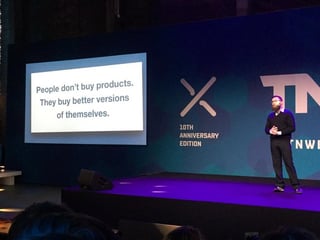"User onboarding is a subset of user retention. It's the earliest and best opportunity you have to retain your customers."- Samuel Hulick, UX consultant and author


Samuel Hulick
User Onboarding Champion
UserOnboard
Samuel is passionate about user experience (UX) and software design. It's one of the reasons he started UserOnboard.com, a website that provides annotated teardowns of popular web apps' first-run experiences. He noticed a widening gap between software companies and their customers (users) when it came to the onboarding experience.
In our latest episode of Helping Sells, hosted by Bill Cushard and Sarah E. Brown, Samuel sat down to chat about the relationship between user onboarding and customer education, and why it's important to get everyone in an organization focused on helping the customers be successful with their products.
You can listen to Helping Sells here, on Apple Podcasts, Stitcher, SoundCloud, or wherever you listen to podcasts.
The pattern in user onboarding
Throughout his experience with software companies, Samuel noticed a pattern in user onboarding that he found disappointing. Products are almost always designed for on-going use by advanced users, with little thought to helping users get to that advanced state.
Onboarding "education" is added at the last minute, usually through a hastily recorded and released speaker tour of the product. The tour only ever points out part of the interface and rarely shows users how to accomplish meaningful tasks with them.
The schism that exists in every software organization
While product development is focused on adding new features and functionality to help the well-established users, marketing is solely focused on driving awareness and generating signups. The two teams are focused on the opposite ends of the user journey and no one's paying attention to the in-between.
How customer education could help with onboarding
From Samuel's perspective, customer education (CE) is another tool that software companies could be using to accomplish onboarding better. In fact, Samuel doesn't care whether you're using CE, UX, or marketing, to do it, as long as you're focused on helping customers accomplish meaningful things, that's fine with him.
CE has a dual focus
Samuel explains his two-pronged approach to using CE for onboarding this way: You must first help customer use your products, but then help them accomplish something meaningful that they happen to use your product for. In today's fast-paced tech-dependent world, any tool is as good as the next at getting the job done, so you've got to show them the value in how your product helps them accomplish it.
CE programs can help do that through deep-dive explanations and demonstrations of how the product is used by customers to accomplish similar tasks. Instead of the generic interface walkthrough, try a walkthrough of a common task your user base must accomplish and show how your product helps them achieve it.
"Focus more on the doing and less on the software," Samuel advises.

Image Credit: Andrew Roper/Twitter
To find out more about what Samuel had to say to Bill and Sarah, listen to the latest episode of Helping Sells.
If you liked this episode, you may like these episodes too:




